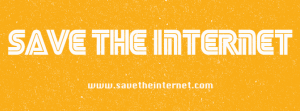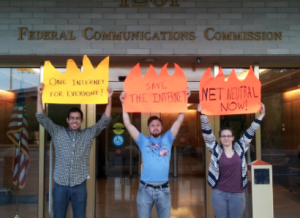Why Net Neutrality Is a Social Justice Issue
Editor’s Note: We’re sharing this article from the ZEEK archive in honor of #InternetSlowdown day. Small online magazines like ZEEK need #NetNeutrality.
Staying on the Sidelines Isn’t an Option
Today, the Federal Communication Commission will set in motion a comment period on a proposal that the FCC chair, Tom Wheeler, says will preserve “net neutrality.”
Wheeler’s proposal is highly contentious, with 150 internet-based corporations, dozens of activist groups, 36 members of the Progressive Congressional Caucus, and hundreds of thousands of petitioners writing in to protest that the proposal will actually end “net neutrality.”
Yet many social justice organizations have stayed on the sideline of this battle. They shouldn’t. Keeping the internet open is, at its most fundamental, a social justice issue.
Net Neutrality Is … What?
The internet is a massive collection of computers linked by electronic signals and governed by a set of shared software protocols that allow packets of data to be passed from one computer to another. You get that data via your internet service provider (ISP), which routes the data from servers to your computer or smartphone over either a wired or wireless connection. You probably know the ISPs as telecom companies—AT&T, Comcast, Verizon, Sprint.
ISPs currently are paid by you, the end user. You’re paying the ISP to give you access to the entire internet. The ISP sends you all the content you ask for at one set cost and at one speed, treating one data packet just the same as another. This is what is meant by net neutrality. All content is “neutral” over the internet.
The telecom companies, however, complain that some content, like streaming video, takes up more bandwidth than, say, sending a text message. The telecoms argue that the new high-bandwidth content costs them money and that the rates that content providers pay should be tied to how much bandwidth they use. For example, Comcast has told Netflix that Netflix must pay Comcast a fee if Netflix wants viewers to see streamed videos.
What many of us fear is that if the ISPs are allowed to ask content providers to pay a toll to get on the internet highway, there will be slow lanes and fast lanes for content.
Ending Up in the Slow Lane
Netflix, Google, Facebook, Tumblr and the other 150 companies that signed a petition in favor of net neutrality obviously don’t want to have to pay to send their content over the internet. However, if they lose, they will pay up. Netflix already is paying. They can afford to pay.
What happens, however, to content providers who can’t afford to pay for the toll road? They will end up in the slow lane, or not on the highway at all.
Who are these content providers who will get stuck in the slow lane?
Independent magazines like Zeek, for one. Only deep-pocketed media organizations will be able to pay for the fast lane. That’s why I’m worried about keeping the internet open. I believe that a functioning democracy needs a wide diversity of opinions and that every voice deserves the same chance to be heard.
Websites that don’t have big corporate backing will also load slowly in a world without net neutrality. That means social justice websites themselves will take ages to load.
For many of us who remember the era of dial-up modems, it’s hard to imagine doing that kind of waiting again. If sites like Hazon or Keshet or UriL’Tzedek or Good loaded up as if you were using a dial-up modem, what are the chances that you would actually stick around – let alone spend time on these sites?
What’s worse, specific content could take longer to load. Videos, but also large images, could take longer to load if the content provider doesn’t pay up. What will that mean for hospitals that send each other X-rays? What will it mean for small businesses that keep their marketing materials in the cloud? Will kids wait around while their homework loads up?
Consequences
Many institutions and organizations will not want to be disadvantaged by slow load times, but they will not be able to afford the ISP’s fees. So they will charge consumers. Want to get the news, get your health report, get your homework in a reasonable period of time? Pay extra!
Who will be most hurt by the end of net neutrality?
Not big corporations. They will pay up and probably pass the cost to the consumer.
Not the 1%. They will pay what they need to pay to get fast internet.
The people who will be hurt the most are those who need the internet most:
Dissident, radical, but also innovative and entrepreneurial voices — people with new and different ideas.
Small business owners especially owners of businesses that currently use the “cloud” to store data and to connect employees.
Educators and librarians who will be stuck on the back roads of the internet.
Moderate- to low-income people who will undergo frustrating waits to get information because they can’t pay for the fast lane.
Children (see educators and librarians)
Imagine if all our highways were toll roads. Imagine if you had to pay extra to get good water pressure at home. That’s what the internet would be like without net neutrality.
It’s a Justice Issue
Social justice issues are usually concrete, tactile, immediate. People are hungry: feed them. People are homeless: house them.
That’s why it’s so hard to talk about the critical importance of an abstract concept like an accesible, open internet. No one will die if capitalism finally consumes the internet. Wars will not be fought. Yet a closed internet will create a very real and very high barrier to any future justice work.
The internet is now our main communications system. Like the telephone before it, the internet provides the fastest, most reliable means our society has to communicate information. Providing different levels of service based on ability to pay will hurt the people who need that information the most.
That’s why all of us should work to ensure that the FCC institutes a strong #netneutrality policy.
PS: There’s a detailed discussion up at the New Yorker about the policy currently before the FCC, and why activists prefer a “Title II” solution over Wheeler’s “706” solution.
PPS:. If you want to take action, go right now to http://www.savetheinternet.com.
Jo Ellen Green Kaiser is the executive director of The Media Consortium. Passionate about mission-driven independent media, Jo Ellen has worked for a succession of independent magazines, including stints as executive director and editor-in-chief of Zeek, managing editor and associate publisher of Tikkun, and publisher of LiP: Informed Revolt. She is driven by a belief that democratic societies thrive only when their members have access to accurate information and informed opinion. She is the co-editor of Righteous Indignation: A Jewish Response to Justice (Jewish Lights) and co-led the Righteous Indignation Project. She has written about Jewish social justice publications including the Jewish Daily Forward, Sojourners, Tikkun and Interfaithfamily.com. She is ZEEK’s board chair.
![[the current issue of ZEEK]](../../image/2/100/0/5/uploads/leftistethicistgraphic-52842c6a.png)
- 5000 Pages of Zeek
- Founded in 2001, Zeek was the first Jewish online magazine, and we have over 5000 pages online to prove it, all available free of charge. Read more in the Archive.
More articles by
Jo Ellen Green Kaiser
More articles in
Media and Tech
- Why Net Neutrality Is a Social Justice Issue
- Morning Jew: Jewish Porn Star, Kansas City JCC Shooter & Spain Doubles Down
- Holocaust-deniers on Facebook, Trapeze-Swinging Singers, Rabbi-Endorsed Polygamy--Nu? It's Morning Jew!
- #OwnBossy, Jewish Charades, God on Facebook -- Morning Jew with Comedians Katie Halper & Heather Gold
- Morning Jew, Mega: Why some scandals are more scandalous than others



